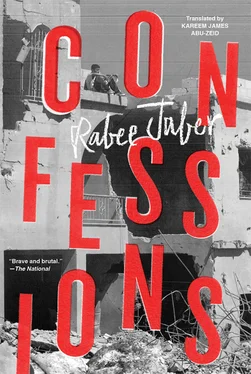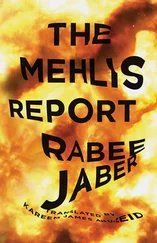But that was a rare occassion: it was unusual for someone to hit me. The people in the neighborhood loved me. Broadwell — a relative of the doctor who’d treated me and who was treating my mother — was the owner of a ful restaurant, and used to sometimes call out to me as I was walking by his store. “Come in,” he’d say, before putting a bowl of hot fava beans on the table for me. He wouldn’t take my money. I remember the first time he called me in: I was rolling a rubber tire (a car tire) on the sidewalk, guiding it with a large stick, but the tire kept falling over on its side. I’d lift it up again, and once more it would fall: it would roll in front of me as I took a step forward, but then topple over. I heard someone laughing, and when I looked up I saw him standing in the narrow doorway of his restaurant, wiping his hands on his white apron. As I looked into the restaurant (it was empty), and then up at him once more, he kept on laughing, and signaled for me to draw nearer.
“You’re Felix’s son, aren’t you?”
He told me to leave the tire outside the door and the stick beside the tire. He was talking and laughing, and he pointed me to the sink inside and told me to wash my hands. Then he asked me what my name was. “Maroun,” I said. “Do you like ful , Maroun?” he asked. I replied: Yes, I like the fava beans my mother makes, and the ones my sister Mary makes, but my sister Julia says the ful in restaurants is even more delicious. He went through the small door that led behind the stone counter: strangely shaped containers were lined up along the counter, and he was standing beneath a shelf covered with many jars of pickled vegetables. I’d seen those jars when I passed by outside the restaurant: red turnips, black eggplants, green cucumbers, and pickled green tomatoes. I looked at the jars of turnips in wonder and was struck by their color.
I ate the stewed fava beans while he sat at the table facing me, smoking his cigarette and looking out at the empty street as the sun shone on it. Did you like the ful ? he asked me. This isn’t ful , I replied, My sister always makes ful for me — is this really ful ? I remember him laughing as I spoke. He used to love the way I talked. Don’t repeat this to your sister, he replied, but ful from home isn’t really ful . I boil the beans over a gentle flame all night long, I season them with my own mix of spices — it’s a secret recipe, no one knows these things but the other ful makers. Each one has his own recipe, and when he grows old he calls his eldest son to him and tells him the secret.
I asked him if he’d told his eldest son the secret, and he said his son wasn’t quite old enough yet. Then, I asked him if he’d tell his son when the time was right. He said he’d try, but his children were in America, and America was far away. He asked me if I knew where America was. I told him we were learning geography and history at the Sacred Hearts School: there was a big map hanging in the classroom, and I knew where America was: “America’s right beside the classroom door.” Everyone in our house heard that sentence. I don’t know how my words reached home, but Mary knew I’d had Broadwell’s ful , and anytime I asked her for some for breakfast she’d scowl and say: Go have your friend make it for you, I don’t know how. (Years later, when Najwa was leaving for France via Cyprus and we went to say goodbye to her at the port in Jounieh, Ilya scolded Mary, who had tears in her eyes, and said: “Your sister’s not going to America, France is closer than the classroom door.”)
I loved that ful maker and used to call him “my uncle.” Whenever I passed by his restaurant — which was near the Mayor’s residence — and the restaurant was empty, he’d tell me to come inside. He always filled up an earthenware bowl for me. I can still see the white metal ladle dipping into the deep pot and emerging full of fava beans. And the steam — a cloud of steam would rise as soon as the cover was lifted from the pot, which had been boiling the whole time on the stove. I’d always look through the glass that separated us, and I’d stand on my tiptoes, trying to figure out what else he put into the small stone mortar where he mashed the garlic. And he’d laugh and refuse to reveal his secret. To this day I can’t smell bitter oranges without thinking of that place: the white and red square tablecloths, the wood-paneled walls, the jars of turnips, the bunches of parsley and mint in plastic bottles, the smell of that seventy-year-old man who’d place the bowl of ful drenched in olive oil in front of me. And the smell of bitter oranges mixed with the smell of cumin.
His questions didn’t bother me, even though they were strange. He’d ask me, for example, if I loved my mother. Or who I loved more, my mother or my father. The questions themselves weren’t strange. Rather, his voice. Something in his voice would change when he asked me those questions. His tone wouldn’t change, no, that’s not it, I don’t know how to explain it — words can’t explain what someone is saying, what they’re feeling. I noticed a strange gleam in his eyes when he asked me those questions. As if he were focusing his gaze on a single point on my face, as if he wanted to pierce me with that gaze and discover my secret. But what was the secret?
Ilya acted the same way sometimes. During the Hundred Days War, when the shelling was so intense that we were confined to the living room day and night, I’d catch him staring at me with that same strange look in his eyes: as if he wanted to peer into my depths. No, not my depths, I don’t know how to say what I’m trying to say. No, it was as if he wanted to see something that he couldn’t see — as if I were hiding another body within my own, a body beyond my body. I didn’t think about those things back then, but maybe that was when I began to feel them (feel? think?). It’s hard now to distinguish what I remember from what I imagine myself remembering. Everything blends together with the passing of time. I saw Ilya: tense, full of power, as if he were about to break the walls. My father forbade him from leaving the house. My father was out all the time, and my brother wasn’t allowed to leave, even though no one could stop him from leaving. My brother never shut the door. He wasn’t very big, and he wasn’t tall either — he’s still quite short, I’m taller than him now. He wasn’t tall, but he had the strength of a bull. I remember him as a rough man who used to frighten strangers. He was small, but violent. Even today, even now that he’s a “businessman,” as he calls himself, even today there’s a certain latent violence in the way he moves. He’s short and, like the math teacher I mentioned to you, he only wears sandals. A businessman in sandals. He has three restaurants: one in Sadd al-Bouchriya; another in downtown Beirut, which hasn’t been doing so well lately; and one in Achrafieh, not far from our old house. He spends all his time on his feet, so he only wears sandals. But they’re expensive sandals. He laughs whenever someone mentions them — he has countless pairs. He spends all his time standing in the doorway of one of the restaurants, smoking his Cuban cigars and keeping an eye on the business. He always wears a blue-jean jacket and black pants. He wears a khaki-colored shirt beneath his jacket, and during the summer he tosses the jacket over his shoulder. He’s the same as always: power bursting out of him. He never sleeps more than five hours a night. He always stays at one of the restaurants until the chairs are put up on the tables. And he arrives before the workers, early in the morning, to keep an eye on the street cleaning. During the Hundred Days War he used to look at me and then at the picture hanging on the wall, the one with the black ribbon in the corner, and then he’d look at my mother, who was staring at him: she knew he was only staying at home for her sake, and she was sad because he was so full of anger and she didn’t know what to say.
Читать дальше












